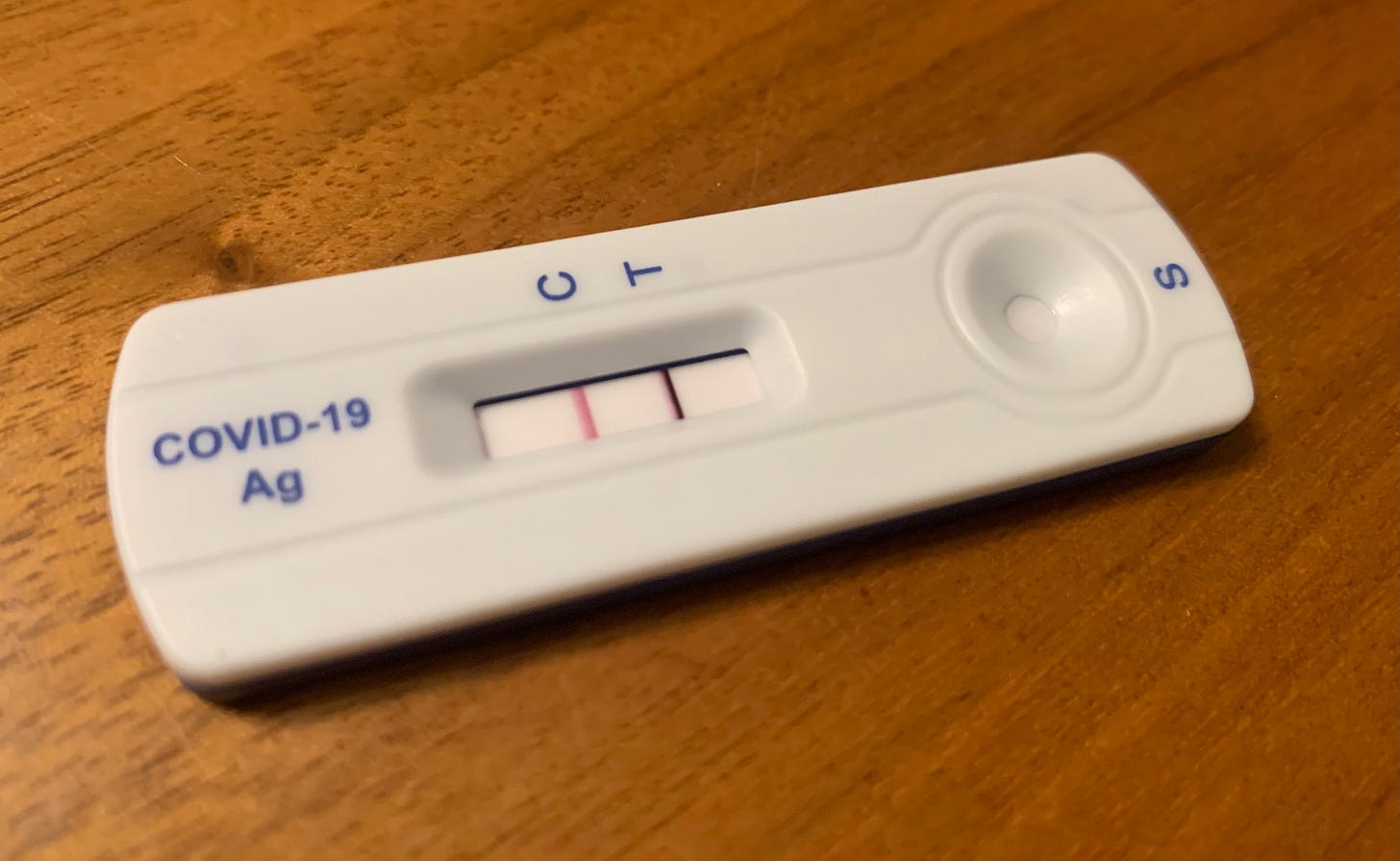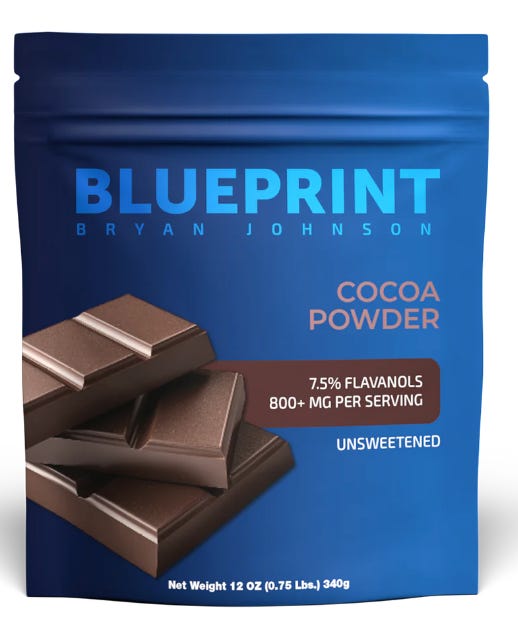Personal Science Week - 240104 COVID Positive
Reflections as three infection-free years come to an end
I felt completely normal when I climbed into bed last Thursday night. But unusually for me, I slept fitfully and woke up feeling tired and achy.
This week I’ll describe my first positive COVID test and some personal science lessons learned.
We last wrote extensively about COVID in PS Week 230727 after my latest report from the Serimmune experimental antibody study revealed I apparently have no antibodies against the SARS-CoV-2 virus. At the time, I noted:
What’s especially odd to me is that it’s not just COVID. I haven’t had so much as a sniffle, not a cold, not a flu — nothing — since the pandemic began. This is probably the longest I’ve ever gone in my life without a cold.
Well, that streak finally came to an end. I woke up on Friday morning feeling achy all over. My sleep that night had been terrible, so it made sense that I was tired and lethargic all day. I had no congestion, no cough, and no headache, but clearly something was off. I slept better the next night, but I still wasn’t myself. It felt like a very mild cold — my first in three years.
A normal person would probably just go about their day, but I’m an aspiring personal scientist, so naturally I want to test myself. Sure enough:
By Monday I was feeling mostly my old self, and by Tuesday I had no symptoms whatsoever. Who knows how I’ll feel tomorrow, or next week, or next month — who does? — but this was a pretty mild way for me to experience the worst pandemic of our lifetime.
What did I do wrong?
Until this week, I was pretty much the only person I knew who hadn’t (knowingly) been infected, but does anyone care anymore?
Earlier in the pandemic, we heard regularly from “experts” who confidently explained why one person got it or another didn’t. At first it was “reckless” and “irresponsible” behavior by denialists. Later it was “Neanderthal thinking”. We were told that the solution was masks for 100 days, then vaccine mandates. You might think COVID is done, but COVID isn’t done with us!
Then all of that changed as one-by-one even the experts were testing positive. By now it’s safe to assume that everyone reading this has already been infected by COVID, many of you multiple times.
Well, maybe you’re tired of hearing about COVID but we personal scientists don’t give up that easily. What do you think I should have done differently?
Here are some possible reasons you might suggest for why I finally succumbed:
I didn’t wear a mask. But many (most?) of you wore masks and got it anyway. Ah, but that was because you didn’t wear it correctly! Or you let down your guard briefly. Or it wasn’t an N95 mask.
I didn’t have the latest booster. But the CDC director tested positive a month after her shot. Ah, but maybe that’s why her case was so mild! When former President Obama came down with COVID despite his up-to-date vaccination status, he advised the rest of us to get the shot anyway. Because, well, the booster still works, sort of.
I didn’t “socially distance”. But (as noted in PS Week 230727) look up the reports from the sailing ship Echizen Maru, where 57 crew members tested positive for covid-19 after more than a month of isolation on the high seas. Or the Antarctic researchers who saw new cases despite lengthy quarantines, multiple negative covid tests, and vaccination.
Do you see the pattern? If you believe in a particular intervention, you’ll find reasons to maintain your beliefs no matter the outcome. Maybe I got COVID because I didn’t wear a crucifix? or I prayed only six times that day instead of seven?
Okay, fine, you’re as tired of this as I am. The fact is, nobody knows for sure why some people get COVID and others don’t. How do we know that any of these “tips” do any good? Maybe you can slow it down, maybe not. But we’re all going to be infected someday.
What about all those published studies? Isn’t that the point of science — collect data and dispassionately follow it to its conclusions. That’s how professionals do it, right?
As a personal scientist, you can (and should!) read studies, but always remember that you are not some statistic in a study: you’re you. Every study contains outliers. It’s possible that you are one of the outliers, so it’s okay to be skeptical of the conclusions and to rely on personal experience when it seems to conflict with “expert” advice.
Who dies of COVID?
Did you panic, especially during the early days of the pandemic when you heard about “super-spreader events”. Forecasters and modelers confidently projected scary death tolls after various “irresponsible” gatherings in 2020. Were they right?
Almost 7 million people have died of COVID, including over 1 million in the US. Overall statistics like these are hard to internalize. Now that you and nearly everyone you know has had COVID, how might we think about COVID deaths in a way that hits closer to home?
Hopefully your family was spared the worst outcomes, and if so, how much of it was luck and how much was thanks to your careful mitigation efforts?
For all the millions of deaths, one curious statistic I rarely see discussed is why there seem to be so few famous people who died. During the AIDS epidemic, you could immediately rattle off famous names whose lives were cut short (Freddie Mercury, Arthur Ashe, Rock Hudson, Isaac Asmiov etc.). What about COVID?
Wikipedia keeps a list of notable people who died from COVID. It’s striking how few names I recognize, especially among ages under 70 or 80. Maybe former US Secretary of State Colin Powell (age 84) or Presidential candidate Herman Cain (multiple conditions including diabetes, age 74).
Similarly, except for the Wuhan researcher who made the first warnings about COVID, all names on an Effective Altruism site memorial of scientists and researchers who died were born before 1960. Can you really say any of these were unexpected?
It’s important to distinguish between two aspects of the COVID pandemic:
A contagious illness
The unprecedented, society-wide reaction
Now that we’ve all experienced (1), I know we’re tired of hearing about it. But I hope more attention is paid to (2) to ensure that the obvious over-reaction never happens again.
More Links
Lest this week’s issue make you too dismissive of the very real suffering COVID has brought to some people, check out the Curious substack by my friend Salvatore Mattera. He is among the most knowledgeable people I know on Long COVID and is worth contacting if you or someone you know is affected.
Chris Masterjohn writes a lengthy critique of that longevity “Blueprint” from Bryan Johnson. We’ve previously dismissed Johnson’s effort as a publicity stunt – no serious personal scientist refuses honest feedback the way he has. We’ll see if Masterjohn’s thoughtful post gets a reaction for its main claims:
Much of the improvement is simply due to exercise and healthy eating.
Why do scientific publications like Nature feel the need to endorse political candidates? Do they think there is a reader somewhere who thinks “Well, I was thinking of voting for the other guy but then that editorial in Nature convinced me I was wrong”.
Well now the results of a preregistered study of 4000 respondents confirm what you’d expect: large drops in trust in Nature and little evidence that any minds were changed.
These results suggest that political endorsement by scientific journals can undermine and polarize public confidence in the endorsing journals and the scientific community.
Now that universities are paying the price for their own ill-advised urge to “take a stand” on political issues, hopefully the science journals will learn their lesson too and stick to the science.
Speaking of science that goes too far, are you aware of the dangers of Dihydrogen Monoxide? This common chemical is a factor in millions of deaths. DHMO.org is here to help.
About Personal Science
This is a weekly summary of thoughts and ideas we think are helpful to anyone who wants to use science for practical, everyday uses. Personal Science Week is delivered free each Thursday; paid subscribers can also access our Unpopular Science series with ideas and links that might compromise your standing with professional scientists.
Please contact us if you have other topics of interest, ask informally in our chat, or leave a comment.




